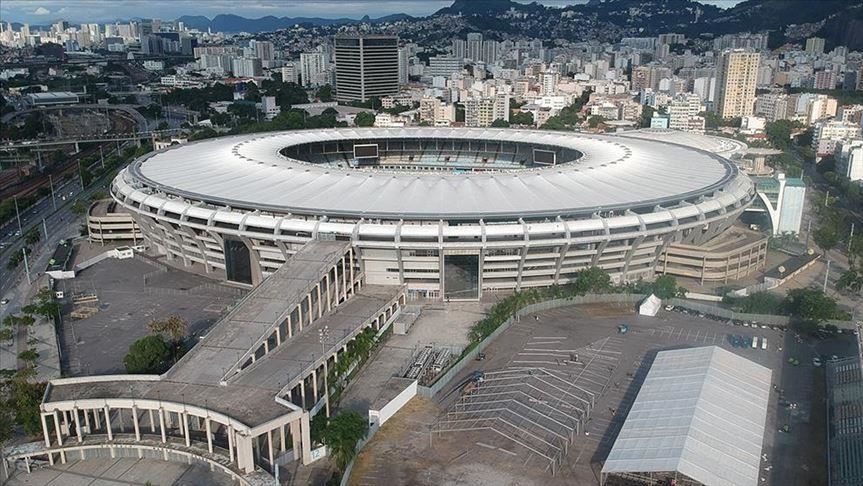
Maracana and Pacaembu are among the soccer grounds that will serve as emergency headquarters to receive patients.
With 40,581 confirmed cases and 2,575 deaths, Brazil is facing the coronavirus crisis with a health system on the brink of collapse.
For this reason, the construction of field hospitals has been stepped up.
Even in a country that is a five-time world champion, sacred soccer temples are becoming large-capacity medical complexes to exclusively receive the Coronavirus infected.
On April 1, when the pandemic was already part of the daily lives of Brazilians, a 200-bed field hospital was opened in Paulo Machado de Carvalho Stadium, better known as Pacaembu, located in the central region of Sao Paulo.
The Pacaembu, inaugurated on April 27, 1940, served as the setting for the best days of Pelé. “El Rey” is, until today, the top scorer that has played in this field, with a record of 115 goals in 119 games.
In addition, it has already hosted five World Cup games in 1950 and three Copa Libertadores finals among various definitions of national and state championships.
“I am from Guapiara, in the interior of Sao Paulo, and I came to this city last year to work. I always dreamed of knowing this stadium, although I never imagined that it would be under these conditions,” said Edivaldo Lopes dos Santos, who was provisionally hired by the logistics team that operates Pacaembu during the emergency.
“I love football, I’m a fan of Palmeiras, and here my team played a lot. But today, we are talking about another situation, something more serious,” said the 37-year-old employee, who currently performs electrical maintenance and other tasks.
Beyond the precautions taken, contact is inevitable between the people who work as managers of health and maintenance of the place.
“The fear of the contagion is always there, although we all work with masks and try to be apart. But you have to keep going because many sick people are helped here.”
In the Pacaembu, which was privatized a little over a year ago, two large tents of 6,000 square meters were installed on the lawn.
“The people who arrive at the Pacaembu are cases of low complexity. They stay there for about 10 days and, once stabilized, they return home,” explained Bruno Covas, the mayor of Sao Paulo.
Those patients whose cases worsen will be referred to hospitals. Albert Einstein Hospital, one of the most prestigious institutions in Sao Paulo, is in charge of the tasks in the Pacaembu.
In Sao Paulo, there are 14,580 confirmed cases of coronavirus and 1,037 deaths so far, making it the state with the highest number of infections in Brazil.
Maracana, a mythical scenario
The Maracana is the most famous stadium in Brazil and one of the mythical stages of world football where Uruguay was consecrated after the famous “Maracanazo” and Germany beat Messi’s Argentina in World Cup Finals in 1950 and 2014 respectively.
Work at the Maracana began on March 31, and according to the state government, the field hospital with 400 beds available will be inaugurated on April 30.
The difference with Pacaembu is that the field hospital will not be built on the Maracana grass, where Flamengo and Fluminense, the local clubs, played their matches every weekend. The provisional structure is being assembled where the Celio De Barros athletics track used to be.
In addition to the Maracana headquarters, another eight field hospitals are being built in the state of Rio de Janeiro, the second most affected region in Brazil behind Sao Paulo, with 4,899 confirmed cases of COVID-19 and 422 deaths.
One of these provisional units will be settled at the abandoned facilities of the 2016 Olympic Games, exactly in Riocentro, Barra da Tijuca, where the table tennis matches were played.
In total, these nine campaign structures will offer 2,300 beds in mid-May.
Not only large stadiums in Sao Paulo and Rio de Janeiro were transformed into emergency venues. In Salvador de Bahia, the renovated Arena Fonte Nova, which hosted World Cup games in 2014, is almost ready to house 240 beds dedicated to patients with the coronavirus.
“The structural renovation of the Fonte Nova Arena is almost ready. The state of Bahia has been innovative because here we have a better-planned architecture. We do not use the grass, but the stadium facilities,” said Tereza Paim, undersecretary of Health in Salvador de Bahia, located in the Brazilian northeast.
The Arena Fonte Nova, used by the Esporte Clube Bahia team, also ceded its facilities in Lauro de Freitas in the metropolitan region of the city of Salvador. There, the Fazendao hospital was built with 44 beds available.
Last Saturday, the Presidente Vargas Stadium in Fortaleza received the first 50 patients of low and medium complexity.
Around 336 beds, including a block for the treatment of patients in intensive care, will be put in this stadium.
In Boavista, the capital of the state of Roraima, northern Brazil, the Flamarion Vasconcelos Stadium received 120 beds from the General Hospital. There, however, only suspicious cases of COVID-19 will be handled.
Sao Paulo, Santos, Corintios, Palmeiras (in the state of Sao Paulo), Botafogo (in Rio de Janeiro), Atletico Mineiro (Minas Gerais), Goias (Goiania) and Athletico Paranaense (Parana) have already offered their facilities to fight the pandemic.




